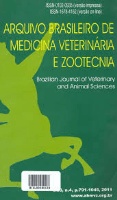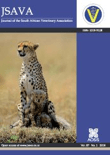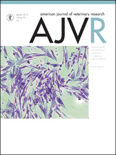
Slovenian Veterinary Research
Scope & Guideline
Fostering Innovation in Veterinary Research
Introduction
Aims and Scopes
- Veterinary Clinical Research:
This area includes studies that evaluate clinical practices, diagnostic methods, and treatment protocols for various animal species, contributing to improved veterinary care. - Animal Health and Disease Management:
Research focusing on the prevention, diagnosis, and treatment of diseases affecting domestic and wild animals, including zoonotic diseases that can impact human health. - Pharmacology and Toxicology:
Studies investigating the effects of drugs and toxins on animal health, including the efficacy of treatments and the safety of veterinary medications. - Genetics and Breeding:
Research exploring genetic factors influencing animal health, disease resistance, and breeding practices aimed at enhancing livestock and companion animals. - Epidemiology and Public Health:
Investigations into the occurrence and spread of diseases in animal populations and their implications for public health, particularly concerning zoonoses. - Sustainable Veterinary Practices:
Studies addressing the environmental and ethical aspects of veterinary practices, promoting sustainable and humane treatment of animals. - Innovative Veterinary Technologies:
Research exploring the application of new technologies in veterinary medicine, including imaging, diagnostics, and therapeutic techniques.
Trending and Emerging
- Antimicrobial Resistance and Alternatives:
Research into antimicrobial resistance is on the rise, emphasizing the need for alternative therapies, such as phage therapy and herbal treatments, to combat resistant infections. - Integrative Genomics in Veterinary Medicine:
There is a growing trend towards using genomics and biotechnological approaches to understand animal health, genetics, and breeding, facilitating personalized veterinary care. - One Health Approach:
The integration of human, animal, and environmental health is gaining traction, with research focusing on the interconnectedness of health issues across species and ecosystems. - Nutritional and Dietary Innovations:
Studies exploring the impact of nutrition on animal health are increasingly prominent, reflecting a recognition of the critical role diet plays in disease prevention and overall well-being. - Veterinary Education and Technology Integration:
Research on the incorporation of technology in veterinary education, such as the use of 3D printing and virtual simulations, is emerging as an important theme, enhancing learning and practice. - Ethical Considerations in Veterinary Practices:
There is a rising focus on ethical issues surrounding veterinary practices, including animal welfare, humane treatment, and the implications of veterinary decisions on animal and public health.
Declining or Waning
- Traditional Animal Husbandry Practices:
Research centered on conventional methods of animal husbandry appears to be decreasing, likely due to a growing focus on more sustainable and humane practices in livestock management. - Basic Pathophysiology Studies:
While foundational studies are essential, there seems to be a reduced emphasis on purely pathophysiological research, with a shift towards applied clinical research and translational studies. - Non-Zoonotic Disease Research:
Research on diseases that do not have zoonotic implications may be declining as the journal increasingly emphasizes topics that connect animal health with broader public health issues. - Invasive Experimental Procedures:
There is a noticeable decrease in studies involving invasive procedures on animals, correlating with ethical concerns and a shift towards non-invasive research methodologies. - Traditional Diagnostic Techniques:
The focus on older diagnostic methods is waning, as there is a growing trend towards adopting advanced technologies and methodologies in veterinary diagnostics.
Similar Journals

ARQUIVO BRASILEIRO DE MEDICINA VETERINARIA E ZOOTECNIA
Fostering collaboration in veterinary medicine and zootechnics.ARQUIVO BRASILEIRO DE MEDICINA VETERINARIA E ZOOTECNIA, an esteemed publication in the field of veterinary medicine and animal science, has been a vital resource for researchers and professionals since its inception in 1996. Published by the ARQUIVO BRASILEIRO MEDICINA VETERINARIA ZOOTECNIA, this journal is recognized for its open-access model, allowing widespread dissemination of knowledge since 1999. With a 2023 Scopus ranking placing it in the 25th percentile within the veterinary field, ARQUIVO BRASILEIRO is categorized in Q3 in Veterinary (miscellaneous), highlighting its commitment to scholarly excellence. The journal's scope encompasses a diverse range of topics related to veterinary medicine and zootechnics, making it a crucial platform for advancing research and professional practice. Situated in Belo Horizonte, Minas Gerais, Brazil, it serves not only the local community but also an international audience, fostering collaboration and innovation in veterinary sciences. As such, ARQUIVO BRASILEIRO is an invaluable asset for students, researchers, and practitioners looking to stay at the forefront of veterinary research.

AUSTRAL JOURNAL OF VETERINARY SCIENCES
Empowering Research, Enhancing Animal WelfareAUSTRAL JOURNAL OF VETERINARY SCIENCES is a prominent platform for innovative research in the field of veterinary science, published by UNIV AUSTRAL CHILE, FAC CIENCIAS VETERINARIAS. This journal, bearing the ISSN 0719-8000 and E-ISSN 0719-8132, serves as a vital resource for researchers, veterinarians, and students interested in advancing their knowledge in veterinary practices and animal health. With its influence reflected in its Q3 category ranking in the Veterinary (miscellaneous) field, and its Scopus rank of #95 out of 194, the journal highlights a robust commitment to disseminating valuable findings and insights. Between the years 2017 to 2024, it aims to provide open access to significant advancements and discussions in veterinary science, ensuring that vital research is accessible to a global audience. Located in Valdivia, Chile, the journal emphasizes its role in enhancing veterinary scholarship and fostering professional development within the community.

Thai Journal of Veterinary Medicine
Advancing veterinary science for a healthier tomorrow.Thai Journal of Veterinary Medicine, published by Chulalongkorn University, serves as a vital resource for researchers, practitioners, and students in the field of veterinary science. With an ISSN of 0125-6491, the journal has been providing a platform for the dissemination of original research and reviews since its inception, with a focus on advancing veterinary practice and animal health in Thailand and the broader Southeast Asian region. The journal is recognized in the Scopus database, currently ranked in the Q4 category for Veterinary (miscellaneous), reflecting its commitment to quality despite being in a highly competitive space. The scope of the journal encompasses a wide array of topics pertinent to veterinary medicine, ensuring accessibility to diverse veterinary disciplines. While the journal currently does not offer an open-access option, it remains dedicated to contributing valuable knowledge and insights to the veterinary community, supporting the improvement of animal welfare and public health initiatives in the region. As it continues to publish until 2024, the Thai Journal of Veterinary Medicine invites contributions that align with its objectives of fostering scholarly discourse and advancing veterinary research.

JOURNAL OF SMALL ANIMAL PRACTICE
Elevating small animal healthcare through research.Welcome to the Journal of Small Animal Practice, a leading publication in the field of veterinary science, dedicated to advancing the knowledge and practice of small animal healthcare. Published by Wiley since 1960, this esteemed journal has established itself as a cornerstone in the veterinary community, boasting an impressive Q1 ranking in the small animals category as of 2023. With a Scopus rank of #5 out of 20, it places in the top 77th percentile, emphasizing its influence and reach within research domains. The Journal of Small Animal Practice serves as a vital platform for disseminating cutting-edge research, clinical studies, and reviews aimed at veterinary professionals and students alike. Although it does not offer open access, the journal's rigorous peer-reviewed process ensures high-quality content that significantly contributes to the field. Join the community of scholars and practitioners who rely on this journal to stay informed on emerging trends and best practices in small animal health.

Journal of the South African Veterinary Association
Elevating Veterinary Insights Across BordersJournal of the South African Veterinary Association is a prominent Open Access journal dedicated to advancing the field of veterinary science since its inception in 1945. Published by MEDPHARM PUBLICATIONS PTY LTD, this journal stands out with an impactful HIndex and a commendable categorization in 2023, ranking Q3 in Medicine (miscellaneous) and Q2 in Veterinary (miscellaneous). With a Scopus rank of 96 out of 194 in the veterinary field, it serves as an essential resource for researchers, veterinary professionals, and students, promoting the dissemination of high-quality research and knowledge. The journal offers a platform for peer-reviewed articles covering diverse topics relevant to veterinary and animal health issues, encouraging expansive dialogue and collaboration within the academic community. Based in Centurion, South Africa, and accessible globally since it adopted an Open Access model in 1997, the journal exemplifies a commitment to accessibility and the sharing of knowledge.

Revista de Investigaciones Veterinarias del Peru
Connecting Insights for Global Animal HealthRevista de Investigaciones Veterinarias del Peru, published by UNIV NACIONAL MAYOR SAN MARCOS, stands as a pivotal resource within the field of veterinary sciences. With its ISSN 1682-3419 and E-ISSN 1609-9117, this journal aims to publish innovative research contributing to the advancement of veterinary practices and animal health. Since its inception in 1999, it has fostered an academic platform for professionals and researchers alike to share findings that are crucial for understanding and improving animal welfare in Peru and beyond. Although currently positioned in the Q3 category of Veterinary (miscellaneous) and ranked #163 out of 194 in the Scopus database, the journal's commitment to quality research and open access to veterinary knowledge continues to attract submissions and readership from a diverse audience. As it moves forward into 2024, the Revista de Investigaciones Veterinarias del Peru remains dedicated to disseminating critical insights that promote evidence-based practices in the veterinary field, stimulating further research and collaboration across continents.

ACTA VETERINARIA SCANDINAVICA
Connecting knowledge for a healthier animal world.ACTA VETERINARIA SCANDINAVICA is a prestigious open-access journal dedicated to advancing the field of veterinary science and promoting interdisciplinary research. Published by BMC since 2001, this journal has become a vital resource for veterinarians, researchers, and students worldwide, with an ISSN of 0044-605X and an E-ISSN of 1751-0147. With a remarkable impact factor reflecting its relevance—ranking in the Q2 quartile for Veterinary (miscellaneous) and Q3 for Medicine (miscellaneous)—ACTA VETERINARIA SCANDINAVICA focuses on a broad spectrum of veterinary topics, ensuring that critical research is available to the academic community and beyond. Located in the United Kingdom, this journal has successfully converged its publishing efforts from 1960 to 2024, highlighting its long-standing commitment to veterinary excellence. Researchers are encouraged to submit their work through the journal’s user-friendly platform, contributing to the ever-evolving landscape of animal health and welfare.

AMERICAN JOURNAL OF VETERINARY RESEARCH
Advancing Veterinary Science Through Rigorous ResearchAmerican Journal of Veterinary Research, published by the American Veterinary Medical Association, serves as a cornerstone of the veterinary medical community, providing essential insights from 1945 to the present. With an ISSN of 0002-9645 and E-ISSN of 1943-5681, this esteemed journal focuses on a diverse range of topics within the veterinary field, contributing to the advancement of veterinary science through rigorous peer-reviewed research. Ranking in the Q2 category in Veterinary (miscellaneous) and Q3 in Medicine (miscellaneous) category as of 2023, it holds a respectable position in Scopus rankings, further emphasizing its impact in the field. While currently not an Open Access journal, its objective remains clear: to disseminate cutting-edge research that informs clinical practice and enhances animal health and welfare. The American Journal of Veterinary Research is invaluable for researchers, professionals, and students seeking to stay at the forefront of veterinary advancements and innovations.

Iranian Journal of Veterinary Research
Empowering Veterinarians with Cutting-Edge InsightsWelcome to the Iranian Journal of Veterinary Research (IJVR), a prestigious platform dedicated to advancing the field of veterinary science. Published by Shiraz University, this journal plays a pivotal role in disseminating high-quality research findings amid a vibrant academic community. With its ISSN 1728-1997, and a convergence of studies from 2008 to 2024, IJVR serves as an essential resource for veterinarians, researchers, and students interested in Animal Science and Zoology. Recognized in the Q3 quartile for both Animal Science and Veterinary categories, it holds a respectable position with Scopus rankings placing it in the 54th percentile among general veterinary journals. Although it currently lacks an open access model, the journal ensures that cutting-edge veterinary research is presented with rigor and relevance, fostering knowledge that contributes to animal health and welfare. With its strategic focus on innovative methodologies, clinical practices, and the biological sciences, the IJVR is set to become your go-to source for critical advancements in veterinary research.

PESQUISA VETERINARIA BRASILEIRA
Exploring the frontiers of animal health and welfare.PESQUISA VETERINARIA BRASILEIRA is a premier scholarly journal that serves as a vital platform for disseminating high-quality research in the field of veterinary sciences. Published by REVISTA PESQUISA VETERINARIA BRASILEIRA, this Open Access journal has been a beacon of knowledge since 1997, allowing global access to its valuable content and fostering collaboration among researchers, professionals, and students. With an ISSN of 0100-736X and an E-ISSN of 1678-5150, it stands out for its commitment to enhancing the understanding of veterinary practices, animal health, and public health implications in the context of Brazil and beyond. As of 2023, it holds a Q3 category in veterinary miscellaneous and ranks at the 43rd percentile according to Scopus, reflecting its growing influence and contribution to the veterinary community. Based in Seropédica, Rio de Janeiro, this journal publishes research covering a wide range of topics, aiming to facilitate knowledge exchange and drive innovation within the field. Join the conversation and contribute to the advancement of veterinary science through your submissions and readership.